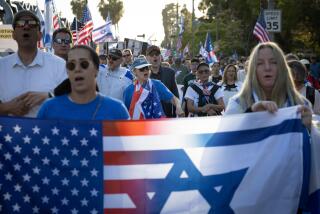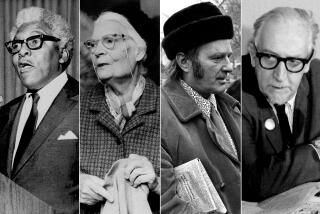Working for World Peace--Religiously
- Share via
A Presbyterian clergyman from Anaheim, Dr. George B. Grose, and I were worrying about an age-old thief of neighborliness and world peace over lunch the other day. Grose has just completed a three-year appointment as visiting lecturer in humanities at UC Irvine.
The title of Grose’s course, “The Judeo-Christian-Islamic Interaction,” furnishes the clue to his vision, which holds that an understanding of the world’s religious cultures could lead to an understanding of its complex politics and hence contribute to world peace.
He points out that although history is rife with bloody conflicts between true believers, there are plenty of instances of “benign” conflicts of a political nature that corrupt truth and freedom in the name of theological certitude.
Grose believes that the sensible equation toward the goal of world peace requires understanding of the world’s three predominant religions. To ignore this “has devastating consequences in international, national and individual lives,” he says.
He points out that in our lifetime there will be in America as many Muslims as Jews. The two don’t get along. The Christians don’t always show friendly feelings toward either of them.
“There is resistance in American thinking to facing up that the Muslims are here,” he points out. “There will be in a decade 6 to 8 million Muslims here. The Pacific Rim, the Near East and North Africa have growing numbers of Muslims.”
There was a breadth and depth to Grose’s UCI course that is impossible to convey in a short column. Suffice it to point out that students studied the Bible, Torah and Koran, not narrowly as comparative religion, but as Christian-Judeo-Islamic interaction.
Historical events such as the Crusades and Spanish Inquisition and personalities such as Luther, Calvin and Theodor Herzl, the founder of Zionism, that polarized or united politics and thinking were examined.
These events and others continue to exert influence on today’s political thinking and reactions, in many instances automatically, mindlessly, the dead hands of the past guiding us into conflicts that could be avoided by enlightenment, understanding and dialogue.
This then is Grose’s fresh academic discipline. It may very well earn him the prestigious Templeton Foundation Prize for Progress in Religion, for which he has been nominated by Dr. Cynthia C. Wedel, former president of World Council of Churches.
Grose has lectured widely, carrying his message to more than 100 colleges and universities, and, on the whole, he says, reactions have been favorable. To me, a UCI student, Marilee Ann Hanson, sums up solidly in a letter what Grose is about:
“The Judeo-Christian influence on the Western World has been so pervasive that this influence is usually taken for granted by most people and politicians. In the Middle Eastern countries, Muslim views dominate the opinions and thoughts of the people. Only in understanding the religions which have determined culture and politics will people be able to effectively work on world peace and understand the basic similarities and differences in religious forces that essentially rule the thought patterns of the world’s people and leaders.”
Amen!
More to Read
Sign up for Essential California
The most important California stories and recommendations in your inbox every morning.
You may occasionally receive promotional content from the Los Angeles Times.













